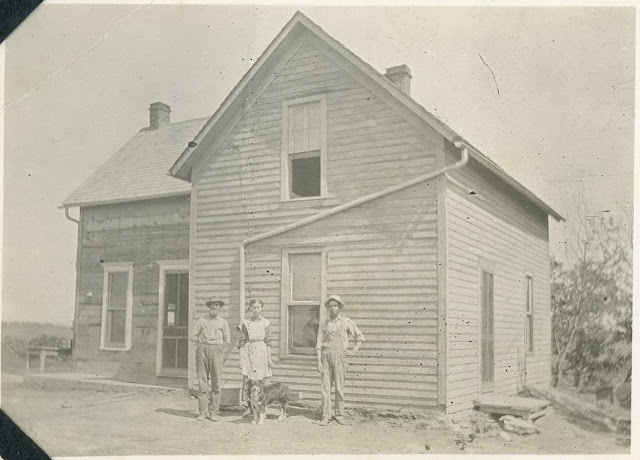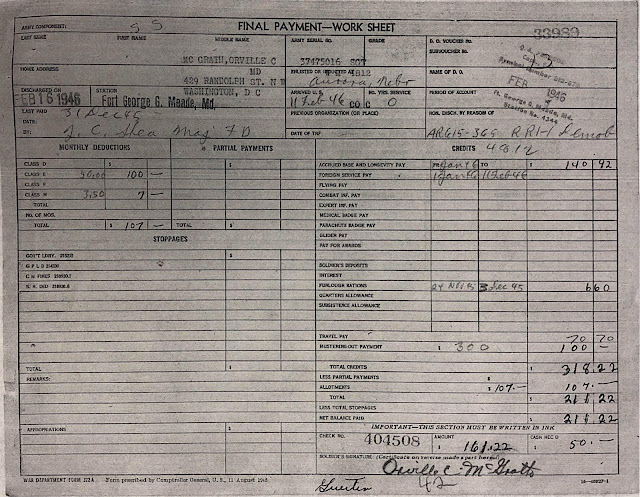My Great Grandma Sadie Negley received an autograph book from her brother Willie for Christmas in 1893. She was 13 years old. The album measures 5-3/8 x 3-1/2 with a red embossed cover. Images of every page might be a bit much to include here, so I will include only a few but I have transcribed all of these pages.
"Eldorado, Nov. 14th 189? (torn)Dear Sadie,
A place for my name in your album
A place for my name in your heart.
A place for us both in heaven,
Where dear friends never part.
As Ever Your friend,
Mary Hohnbaum"
"Eldorado, Nebr. Aug. 25, 1899
Dear Sadie
A wish to a friend
Is often given
But my wish for you
Is a home in heaven.
Your Friend
L. M. H."
"Eldorado, Nebr.,
Dec. 28th, 1893
Dear Sister,
May your life be long and happy,
May your enemies be few,
May your friends be just as many
As the sparkling drops of dew.
Your Sister,
Alice Negley" "Remember me" written on the left-hand side
"Eldorado, Nebr.
Feb 23rd, 1895
Dear Sister
Remember me dear
Sister when on these lines you look
Remember it was Willie that
Wrote this in your Book
Your Brother
Willie D Negley"
"Dear Saidy your
Album is A golden Spot
in wich I write forget
me not your Aunt
Mary Negley"
"Eldorado, Neb. Dec. 18th, 1897
Sadie Negley,
oh Forget me not
Recall the days of yore
Those days Ive ne'er forgot
Melvin Hay"
"Eldorado, Nebr.
Oct. 21, 189?
Dear Sadie:
Be a good girl and have
good times
And marry the man
that has the dimes.
Your True Friend
Vella Bradley"
"Dear Sadie Eldorado
March 10, 1895
Be the matter what it may
Always speak the truth
if at work, or at play,
Always speak the truth.
Yours Friend Ruth Osborn"
"Harvard Nebr.
Remember me for ever
Your Frind
Alice Roys
March 16, 1894"
"Dear Sadie
Remember me is all I ask
And if remembrance be a task
Forget me.
Your Friend
Gertie Ayer
Eldorado, Nebr; Feb. 1, 1894"
"Friend Sadie; Eldorado, Nebr.
There are few friends in this wideworld
Whose love is found and true,
But, Sadie when you count them over,
Place me among the few.
Your Schoolmate,
Hulda England
Feb. 1, 1894"
"El Dorado Nebr
Dear Friend, Nov. 24, 98
Forget me not
Forget me never
Till the younders sun
Shall set forevr
Your Frind Carl Campbell"
"Friend Sadie
When the spring roses in the gardens
are fair
Like the spirit of love left every where
And each flower and herb on earth
dark breast
Has rose from the dreams of its win-
try nest, Then think of me
Your friend Edna Moore"
"Eldorado, Nebr
Jan. 16, 1894
Dear Sadie,
Remember well and bear in mind
A trusting friend is hard to find
And when you find one that is true
Don't change the old one for the new
Your Friend
Nevie Ayer"
"Friend Sadie
Up and you will I love you love
Read down and see that you if me
Ever your friend
Cora Rogers
Eldorado Neb
3-28-1894" [written up-side-down on the page]
"Remember me [written on left-hand side]
Friend Sadie Eldorado
March 30
When days are long and
friends are few remember
me and I will you.
Your friend
Grace Heiser"
"Dear Schoolmate Eldorado, Nebr
Long may you live
Happy may you be
is my best's wishes
for thee
Your Schoolmate
Gertha Anderson
Dec. 29, 1893"
"Eldorado Nebraska
Dear Sadie March 10 1895
For get me now, for get me
never. Untill the bright sun
has set for ever. Yours truly
Mabel Osborn"
"Eldorado, Nebr. Dec. 29, 93
Friend Sadie:
If ever a husband you should get
And he this book should see,
Tell him of your youthful days
And kiss him once for me.
Your Schoolmate
Rosie Shorey"
"Eldorado Neb.
Dec 29th 1899
A kiss for a blow
Always bestow
And Angels will
guard you where
every you go
Your Father
J F Negley"
"Eldorado Neb. Dec 29th 1897
Sadie Negley
May This New year bring
increase to the world
and you of peace.
your friend
Mrs Mima Hay"
"Eldorado Neb.
May 7, 1900
Dear Friend
In case of a storm when you
need an umbrella
May you have it upheld by
a handsome young fellow
Your Friend
Cora Hunnel"
"Decatur Ia
Oct. 21, 1901
Dear Sadie
When on this page
You chance to look
Just think of me
And Close the book
Verne Negley"
"Eldorado
Dec 12/28 97
Miss Sadie
The Taller the Tree
the Titer the Bark
the Prettier the girl
the Harder to spark
Your Truly
Wm R Hay"
"Decatur City Iowa 1894
Sadie is your
Name Single is your
station happy be
the little man
when he makes
the alternation
[written criss-cross] "May Angels twine bright Roses around they Cross
your cousin
Harry Negley"
"Eldorado Nebr.
Dear friend Sarah July 1900
When you are old and
cannot see put on your
specks and think of me.
your friend
Gracie Kilmer"
"Decatur Iowa
July 22, 94
To Sadie
Remember the Sabath
Day to Keep it Holy
From your uncle
C. Negley"
"Eldorado, Nebr
May 31-19
Dear Sadie
May you live happy
All the days of your life
Get a good husband
And make a good wife
Your Friend
Mattie Hunnel"
"Eldorado Neb April the 21 95
Dear Sadie
Tell one not in mornful
numbers, life is but an
empty dream. and the soul
is dead that slumbers
and things are not what
they seem Stella Rath"
"1901 Eldorado 9-20
Friend Sadie
Complements of
E J Palmer"
"1901
Friend Sadie
You ask me to write in your Album
And I've done so with-out a
frown
But thinking it would look better
I've written it up-side down
Your Friend Etta ?"
"Eldorado Nebr
March 25th 1894
Dear Sister
Remember me When this you see
Though many miles apart we be
And if the grave be first my lot
Remember me forget me not
Your Brother
Geo O Negley"
"Jan 14 94
Eldorado, Neb
To Sadie
A friend in need is a friend
indeed your friend
Ray Cosand?"
"Eldorado Nebr
Dear Sister
Remember me,
Forget me now.
Your Brother
Callie Negley
Dec. 28th 1893"
"April 4th (torn) 17
Remember me Dear girl
When on these lines you
look remember it was
your Mother that wrote
them in your book.
Your Mother Sarah M
Negley"
"Eldorado Nebr
Friend Sadie Oct 15th 1903?
May your life be long and happy
May your enemies be few
May your friends be just
As many as the sparkling
Drops of Dew
Your friend
Cora Kilmer"





































